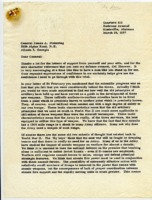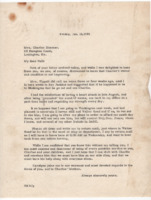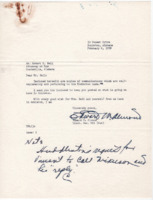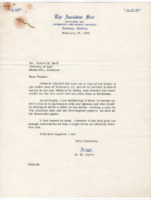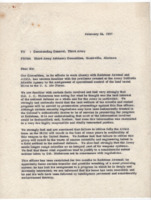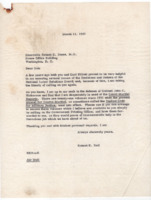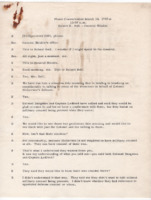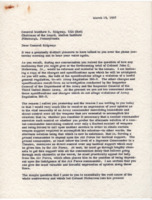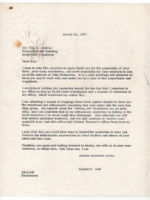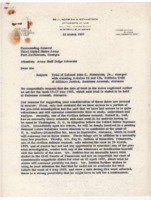
Browse Items (215 total)
Sort by:
-
Letter from Col. John C. Nickerson at Redstone Arsenal in Huntsville, Alabama, to Gen. James A. Pickering in Atlanta, Georgia.
In this letter, Nickerson thanks Gen. Pickering for his support and explains why he believes the Army is the best service branch to develop ballistic missiles. He also discusses the need for missiles in case of war with the Soviet Union. Nickerson was a staff officer at the Army Ballistic Missile Agency at Redstone Arsenal assigned to work on the Jupiter, the United States' first mid-range ballistic missile. He was arrested and court martialed for espionage in 1957 after releasing sensitive documents about the United States missile program to the press. At the time, Secretary of Defense Charles E. Wilson granted the Air Force sole authority to develop intermediate range ballistic missile systems. Nickerson disagreed with this policy, and in response, leaked documents that demonstrated the superiority of Army missiles compared to those developed by the Air Force. He eventually pled guilty to lesser charges and was suspended from the Army for one year and was fined $1,500. Dr. Wernher von Braun was among those who testified on Nickerson's behalf. -
Letter to Mrs. Nell Zimmer.
This personal letter from Robert K. Bell details personal health conditions and an upcoming trip to Washington. -
Correspondence between Robert K. Bell and Edward M. Almond.
These letters include information pertaining to the Nickerson case. Almond expresses desire to "get something in motion to subdue the unnecessary and trivial expressions of � General Medaris". The letters also mention various correspondence that was included in the exchange of information. Both men advocate for the "cause" of Colonel Nickerson's actions. Bell was Nickerson's attorney during his trial. -
Correspondence between Robert K. Bell and Harry M. Ayers.
In response to Bell's February 13 letter from Edward Almond, Ayers informs Bell that he is attempting to find someone who would write a letter to newspaper publications in agreement with their opinion that Medaris is taking too much credit for his work. Bell responds that he is skeptical Ayers would find anyone as Medaris could make their life a "rather miserable existence". -
Letter to the Commanding General, Third Army, from the Third Army Advisory Committee.
This letter details the committee's agreement with Nickerson's actions, believing he was acting "for what he thought was the best interest of the national defense." They advocate for the inclusion of the Army Ballistic Missile Agency team on the intermediate-range ballistic missile program. The committee states that trial by court-martial would not reflect the many accomplishments Nickerson has made for the Army weapon program and feel it unnecessary. -
Letter to Robert E. Jones from Robert K. Bell.
Robert K. Bell writes to Senator Bob Jones for help and information regarding the Nickerson case. -
Phone conversation between Robert K. Bell and General Shinkle
The transcript details a conversation regarding the necessity of military counsel being present during the conference with Colonel Bengston, Captain Ledford, and Colonel Nickerson and under whose orders was the military counsel under. -
Letter to General Matthew B. Ridgway from Lt. Colonel Charles R. Zimmer.
These documents include the draft of the letter and the final letter. Zimmer writes to Ridgway regarding his testimony and its importance in the Nickerson trial. Zimmer also asks for Ridgway's opinion on the "necessity of an Army commander exercising immediate and direct control" over defense weapons. -
Letter to Ray H. Jenkins from Robert K. Bell.
Bell thanks Jenkins for joining the defense of Nickerson and writes that he included newspaper clippings and other informative information about the case. -
Letter to the Commanding General, Third Army.
In this letter, it is requested that May 13-17, 1957 be set as the dates of the Nickerson trial. It then details the reasons for these specific dates.
